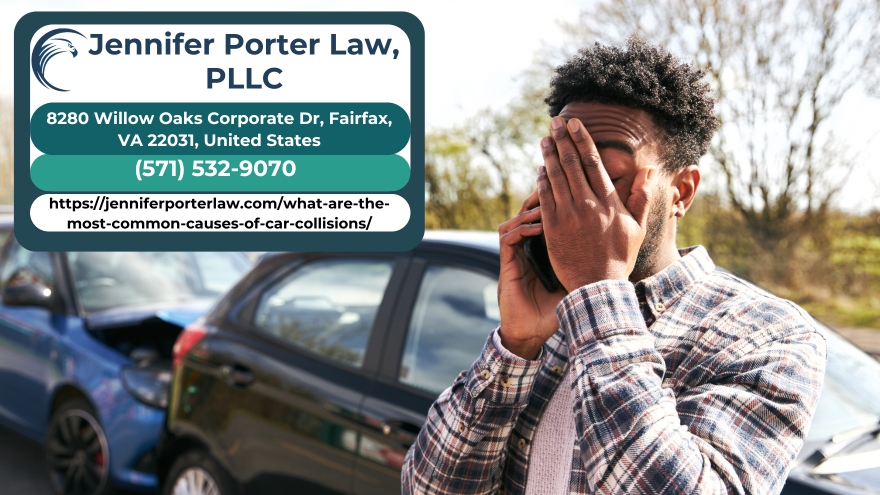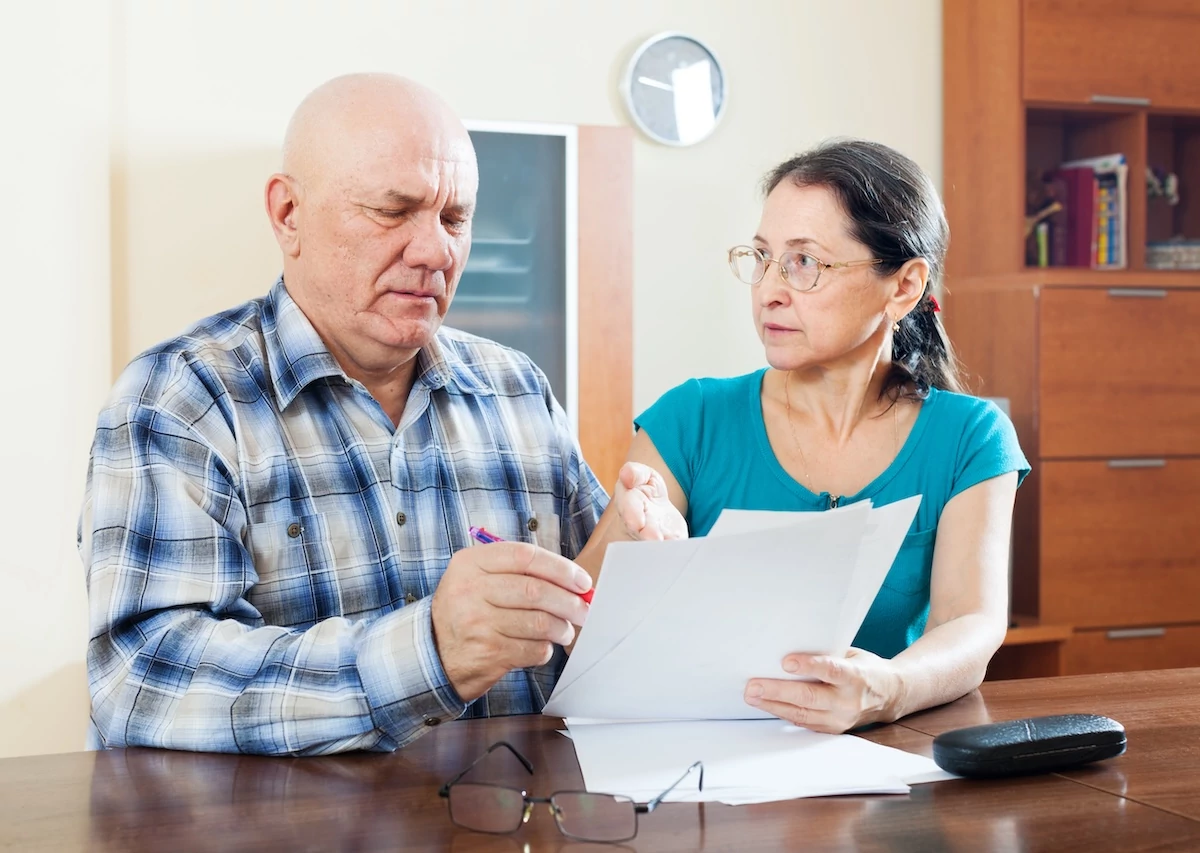Car collisions happen every day in Northern Virginia, often leaving victims with serious injuries, emotional distress, and financial burdens. While some accidents are truly unavoidable, many are the result of preventable factors like distracted driving, speeding, or poor road conditions. Identifying the primary causes of these accidents not only highlights the importance of safe driving but also emphasizes the legal and financial consequences for those involved.
If you’ve been injured in a car accident caused by someone else’s negligence, you don’t have to face the aftermath alone. Our top-rated Northern Virginia car accident lawyers at Jennifer Porter Law PLLC can provide the guidance and support you need to protect your rights and pursue fair compensation for your losses.
No one should have to navigate the legal process alone after a car accident. Our dedicated team at Jennifer Porter Law PLLC is here to help you every step of the way—from investigating the cause of the collision to building a strong case and pursuing the compensation you deserve. Call us today at (571) 532-9070 to schedule a free consultation and take the first step toward justice and recovery.
How Understanding Car Accident Causes Can Help Car Accident Victims
Preventing accidents begins with recognizing the common mistakes and actions that often lead to them. Many crashes happen because of avoidable human errors or unsafe driving habits. Addressing these behaviors and being mindful of external factors, such as road or weather conditions, can help drivers make safer choices.
For those who have experienced a car accident, reflecting on its causes can also play an important role in the recovery process. Knowing what led to the collision can help victims gather the right evidence, such as police reports or witness statements, to strengthen their claim. This understanding can be vital when dealing with insurance companies or legal proceedings, where victims may need to prove fault or counter attempts to reduce their compensation.
Being informed about the causes of accidents also allows victims to protect their rights under Virginia’s contributory negligence rule, which prevents recovery if they are found even slightly at fault. By staying aware of these legal implications, victims can take meaningful steps toward obtaining the compensation they deserve. Approaching the process with knowledge and confidence can make a difficult situation more manageable and help victims focus on moving forward.
Speeding and Reckless Driving
Speeding and reckless driving remain two of the leading causes of severe accidents on Virginia roads, posing significant risks to all road users. According to the Virginia Department of Motor Vehicles, speeding contributed to almost 20% of total car accidents in 2023, resulting in more than 400 fatalities and thousands of injuries. These behaviors not only reduce a driver’s ability to react to sudden changes but also magnify the severity of collisions, often leading to devastating consequences for victims and their families.
Driving at excessive speeds greatly increases the likelihood of crashes. Higher speeds require longer stopping distances, making it harder to avoid collisions when traffic slows or an obstacle appears suddenly. The impact of a crash is also far more severe at higher speeds, with studies showing that pedestrian fatalities rise sharply when vehicles exceed 30 mph. Furthermore, speeding leaves drivers with less time to process and respond to unexpected situations, such as a car merging unexpectedly or a sudden traffic stop.
Virginia law takes speeding and reckless driving very seriously. Driving 20 mph over the posted speed limit or exceeding 80 mph, regardless of the limit, is classified as reckless driving—a criminal offense. Convictions can lead to steep fines, license suspension, and even jail time. Beyond the legal consequences, these dangerous behaviors often result in life-altering injuries or fatalities, underscoring the need for all drivers to prioritize safety and adhere to traffic laws.
Distracted Driving and Other High-Risk Actions
Distracted driving remains one of the leading causes of car accidents in Virginia. It encompasses behaviors that divert a driver’s attention from the road, increasing the likelihood of collisions. In 2023, 16.87% of all car accidents in Virginia were caused by distracted driving.
Distractions can occur in various forms, each of which compromises a driver’s ability to respond to traffic conditions effectively.
Texting and Cell Phone Use While Driving
Texting and using a cell phone while driving are among the most dangerous forms of distraction. These activities require visual, manual, and cognitive attention, leaving drivers incapable of reacting to sudden changes on the road. Virginia law prohibits texting while driving, with penalties including fines and potential demerit points on a driver’s record. Studies show that texting can delay reaction time by several seconds, increasing the likelihood of a crash.
Eating, Drinking, and Other In-Car Activities
Eating or drinking behind the wheel might seem harmless, but it can cause drivers to take their hands off the steering wheel and their eyes off the road. Drivers often spill food or beverages, diverting their focus and creating hazardous situations. While not explicitly banned in Virginia, these actions may be deemed negligent if they contribute to an accident.
Interacting With Passengers or Adjusting Vehicle Controls
Talking to passengers or adjusting in-car controls, such as the radio or air conditioning, can shift a driver’s focus from the road. Engaging in animated conversations or tending to children in the backseat can result in missed cues, such as traffic signals or braking vehicles. Adjusting GPS devices or climate controls, even briefly, can lead to accidents, particularly during heavy traffic or poor weather conditions.
Fatigued Driving
Fatigued driving is a serious but often overlooked cause of car accidents in Virginia. Fatigue affects a driver’s ability to make safe decisions in ways similar to alcohol impairment, leading to slower responses, difficulty staying in lanes, and even brief episodes of uncontrollable sleep, known as microsleeps. Studies reveal that staying awake for 18 hours impairs a driver as much as having a blood alcohol concentration (BAC) of 0.05%, while 24 hours of wakefulness equates to a BAC of 0.10%, exceeding Virginia’s legal limit. Fatigue is considered preventable, meaning drivers involved in accidents caused by drowsiness can still be held liable for negligence.
Distracted driving is not only a public safety concern but also a significant legal matter in Virginia. Drivers must prioritize their attention on the road to avoid accidents and the subsequent legal and financial repercussions.

Driving Under the Influence of Alcohol or Drugs
Driving under the influence of alcohol or drugs is one of the most dangerous choices a person can make on Virginia roads. It endangers not only the impaired driver but also passengers, other motorists, and pedestrians. DUI-related crashes often result in devastating injuries or loss of life. In 2023 alone, Virginia saw almost 7,000 alcohol-related crashes, leading to 293 fatalities and thousands of injuries.
Alcohol and drugs impair a driver’s ability to make sound decisions and respond to road conditions. Coordination, reaction times, and judgment are significantly affected, making it harder to steer, brake, or maintain proper lane position. Impaired drivers may also fail to recognize traffic signs, signals, or vehicles ahead, leading to collisions at intersections or sudden stops. Virginia law takes this behavior seriously, with drivers considered legally impaired at a blood alcohol concentration (BAC) of 0.08% or higher, and even stricter limits for commercial drivers and those under 21. These laws reflect the critical need to prevent such preventable and often tragic accidents.
Virginia imposes severe consequences for driving under the influence to discourage this behavior. Offenders face penalties such as license suspension, fines, mandatory alcohol education programs, and even jail time. In cases where a drunk or drugged driver causes an accident, they may also be held civilly liable for the injuries, property damage, and emotional harm inflicted on victims. Courts often award punitive damages in these cases to further penalize the driver’s conduct.
Following Too Closely: A Leading Cause of Rear-End Collisions
Following too closely, or tailgating, is a common cause of rear-end collisions on Virginia roads. In 2023, rear-end crashes accounted for almost 20% of all traffic accidents in the state, many of which were preventable. Tailgating reduces reaction time and braking distance, making it difficult to stop safely if the vehicle ahead slows down suddenly. This behavior is not only dangerous but also creates anxiety for other drivers, increasing the risk of additional mistakes or accidents.
Virginia law requires drivers to maintain a reasonable following distance, as outlined in Virginia Code § 46.2-816. Violations can result in fines and traffic citations, and they may serve as evidence of negligence in civil cases. Rear-end collisions caused by tailgating frequently lead to costly repairs, injuries like whiplash, and other financial burdens. Maintaining a safe distance and practicing patience can help prevent these avoidable accidents, protecting everyone on the road.
Failure to Yield and Improper Turns
Failure to yield and improper turns are significant contributors to car accidents in Virginia, particularly at intersections and in high-traffic areas. These accidents often occur when drivers disregard right-of-way rules, fail to yield during left turns, or neglect pedestrians at crosswalks. Such behaviors are especially dangerous in busy urban areas or on highways where quick decisions are required to prevent collisions.
Common scenarios include running stop signs or red lights, misjudging the speed or distance of oncoming vehicles during left turns, or failing to allow adequate space for merging traffic. Pedestrians are also at risk when drivers ignore crosswalks, as they have little protection in the event of a collision. Virginia Code § 46.2-821, outlines right-of-way rules to promote safer driving. Violations can result in fines, traffic citations, and liability for damages. Exercising patience, yielding appropriately, and respecting traffic laws are essential to reducing these preventable accidents and keeping Virginia’s roads safer for everyone.
Poor Weather and Road Conditions: External Factors That Contribute to Crashes
Poorly maintained roads are a hidden danger on Virginia’s highways and streets, often contributing to accidents or worsening the risks of bad weather. In 2023, Virginia reported over 900 crashes attributed to hazardous road conditions, highlighting the serious impact of neglected infrastructure. Issues like potholes, cracks, and eroded shoulders can cause drivers to lose control, especially in wet weather when hazards are harder to see. Faded lane markings further complicate safe driving, while uncleared snow and ice create slippery surfaces that increase the risk of skidding or collisions.
When road conditions directly contribute to an accident, local governments or maintenance agencies may be held accountable. However, demonstrating liability requires clear evidence, such as photos of the hazard or witness statements, to show that the condition was known and unaddressed. Addressing these risks and advocating for safer roadways is essential to preventing accidents and protecting lives.
Vehicle Defects and Mechanical Failures
Vehicle defects and mechanical failures contribute to a number of car accidents in Virginia each year, often creating dangerous situations that are beyond a driver’s control. While regular maintenance can help prevent faulty brakes, tire blowouts, steering malfunctions, and other mechanical problems, there are cases where defective manufacturing or poorly designed parts are to blame.
When manufacturing defects contribute to an accident, liability may extend to the manufacturer or distributor, providing an avenue for injured parties to seek accountability. Identifying and addressing these risks is key to promoting safer roads for everyone.
Who Is Liable for Accidents Caused by Vehicle Defects?
Determining liability in cases involving vehicle defects can be complex, as multiple parties may share responsibility depending on the circumstances.
- Vehicle Manufacturers: If an accident is caused by a design or manufacturing defect, the automaker may be held liable. This often involves cases where a defect affects an entire line of vehicles and may lead to recalls.
- Parts Manufacturers: In some cases, liability may fall on the manufacturer of a specific defective part, such as faulty brakes, tires, or airbags.
- Vehicle Owners: Drivers are responsible for maintaining their vehicles. If an accident results from a lack of routine maintenance, such as failing to replace worn tires or brakes, the driver may be held accountable.
- Mechanics or Repair Shops: Negligent repairs or improper installations can also contribute to accidents. For example, if a mechanic installs the wrong part or fails to identify a critical issue, they may be held liable.
Vehicle defects and mechanical failures pose significant risks on Virginia’s roads. Drivers should remain vigilant about maintaining their vehicles, while manufacturers and repair shops must uphold their responsibility to produce and maintain safe products. When defects do lead to accidents, identifying the liable party is vital for securing justice and compensation for those affected.
| Responsible party | Common causes of liability |
|---|---|
| Vehicle manufacturers | Design flaws, manufacturing defects |
| Parts manufacturers | Defective individual vehicle components |
| Vehicle owners | Failure to maintain vehicle properly |
| Mechanics or repair shops | Negligent repairs, improper installation |
Pursuing Compensation After a Car Collision in Virginia
Car accident victims in Virginia often face significant physical, emotional, and financial challenges in the aftermath of a collision. Pursuing compensation can help cover medical bills, lost wages, and other damages. However, Virginia’s laws surrounding car accident claims require victims to act diligently and understand their rights to secure fair compensation.
Knowing Your Legal Rights as a Car Accident Victim
Virginia law provides car accident victims with the ability to seek compensation when someone else’s negligence causes harm. This compensation can address both the financial and emotional toll of an accident, helping victims and their families rebuild their lives after a difficult time.
- Economic damages are intended to cover tangible losses such as medical bills, rehabilitation expenses, property damage, and lost wages.
- Non-economic damages compensate for the deeper, often unseen effects of a crash, including pain and suffering, emotional distress, and loss of enjoyment of life.
- In cases of wrongful death, families may pursue claims to cover funeral costs, loss of companionship, and other related losses.
However, it is crucial to act within Virginia’s two-year statute of limitations for personal injury claims. Waiting too long could prevent victims from pursuing the compensation they deserve, regardless of the severity of their injuries. If filing a claim against a government entity, the statute of limitations can depend on the specific circumstances of the case. Working with a skilled attorney is crucial to ensure adherence to the law and avoid potential issues that can affect your claim.
The Importance of Proving Fault Under Virginia’s Contributory Negligence Rule
Virginia follows a contributory negligence rule, one of the strictest negligence standards in the country. This rule can significantly impact a victim’s ability to recover compensation.
- No Recovery if Partially At Fault: Under contributory negligence, victims are barred from recovering compensation if they are found even 1% at fault for the accident. This makes proving fault an essential component of any car accident claim.
- Burden of Proof: Victims must demonstrate that the at-fault driver acted negligently and that this negligence directly caused the accident and the resulting injuries. Evidence such as police reports, witness statements, accident scene photos, and medical records can play a critical role in building a strong case.
- Insurance Company Tactics: Insurance companies often attempt to shift blame onto the victim to avoid paying compensation. Even a small admission of fault can jeopardize the outcome of a claim under Virginia’s contributory negligence rule.
Given the implications of contributory negligence, accident victims must approach the claims process carefully to protect their ability to recover damages.
Get The Legal Support You Deserve: Contact Jennifer Porter Law PLLC Today
Car accidents can turn your life upside down in an instant, leaving you with physical, emotional, and financial challenges. When someone else’s negligence is to blame, you deserve an advocate who will fight for your rights and work toward the best possible outcome for your case. A skilled Northern Virginia car accident lawyer from Jennifer Porter Law PLLC can provide valuable support, helping victims protect their rights and pursue the compensation they deserve.
Recovering from a car accident can be overwhelming, especially when dealing with injuries, medical bills, and the legal process of seeking compensation. At Jennifer Porter Law PLLC, we are committed to helping car accident victims in Northern Virginia seek the compensation they need to move forward. Contact us today at (571) 532-9070 to schedule a consultation and take the first step toward holding the responsible party accountable.



